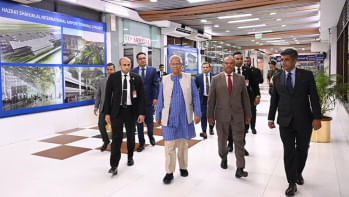Multi-sector approach imperative: speakers
Experts at a virtual workshop yesterday suggested forming a time-bound national framework and proper coordination among government agencies to fight lead poisoning, which has emerged as a global concern for its deadly impact on health and environment.
They also called for enhancing technical capacity and generating awareness among people.
Pure Earth, a New York based organisation working to eradicate toxic pollution in low and middle-income countries, in coordination with the Department of Environment (DoE) arranged the event. It was sponsored by USAID, GAHP (Global Alliance on Health and Pollution), OAK Foundation and Swiss Agency for Development and Cooperation.
A Shamim Al Razi, additional secretary of Environment, Forest and Climate Change Ministry, said the threat arising from lead should not be underestimated.
"We have started to phase out the use of lead. On Sunday, a team of DoE knocked down 16 lead factories in Demra. This is a cross-cutting issue linking commerce, industry and local government ministries. We need a multi-sectoral effort in this regard," said Razi, also the chief guest.
Dr Mahfuzar Rahman, Bangladesh country director of Pure Earth, said children were being poisoned by lead on a massive scale either through lead paint, lead recycling, toys, food spices, traditional medicine, cosmetics, pottery and cookware.
Lead poisoning robs children of their health and potential, he added.
The leading cause of lead poisoning among children living in Bangladesh and similar countries is that they get exposed to recycling of lead-acid batteries, he added.
"The rapidity of the response is crucial here; the longer the exposure continues, the greater the likelihood of disease. We should act accordingly otherwise we will see a major deficit in children's intellectual ability," he opined.
Andrew Mccartor, vice president of Pure Earth, said over the last three decades, deaths caused by lead increased in Bangladesh while it declined elsewhere. Bangladesh now sees fourth highest death rate from lead exposure, he said.
The economic cost of productivity loss from lead exposure is US 16 billion dollar, which is roughly half the income from apparel and textiles, he estimated.
Dr Anwar Sadaat, director (planning, monitoring and research) of Directorate General of Health Service, said some 35 million children in Bangladesh have high blood lead level (6.83 ug/dl). The standard level is 5 ug/dl.
He said Bangladesh currently has no routine blood lead level testing and no evidence generation system as well.
Dr Sadaat identified seven hotspots of lead across the country including Dhaka, Gazipur, Tangail, Bogura, Mymensingh, Khulna and Magura, emphasising the need to enhance capacity to monitor the situation.
Dr Shahriar Hossain, general secretary of Environment and Social Development Organization, said high level of lead has been detected in rice and vegetable. A recent study by Bangladesh Agricultural University revealed presence of one or more heavy metals including lead in five out of 16 food groups, he said.
He stressed on the enforcement of existing law, forming a national framework, imposing a ban on using lead.
Md Ashraf Uddin, director general of DoE, chaired the event.

 For all latest news, follow The Daily Star's Google News channel.
For all latest news, follow The Daily Star's Google News channel. 



Comments